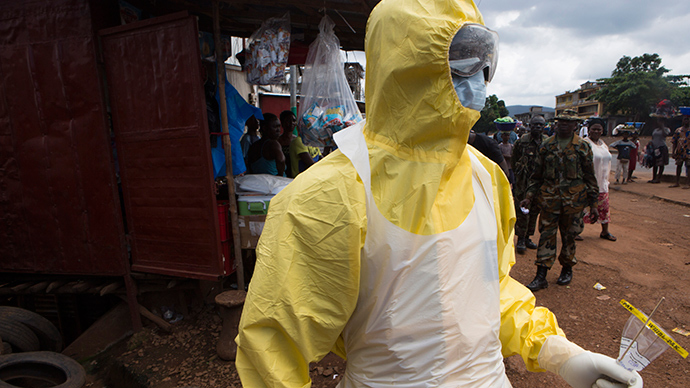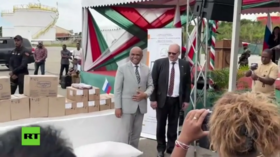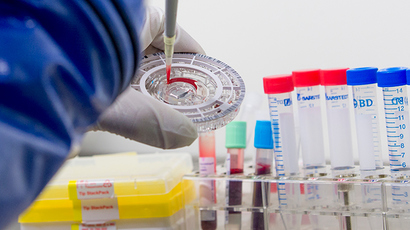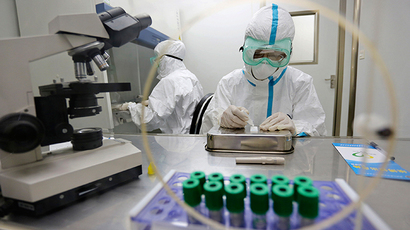WHO admits fudging Ebola response, blames ‘incompetent staff’, swine flu experience

The World Health Organization (WHO) has admitted that its initial response to the Ebola outbreak was slow and disorganized, blaming a lack of information sharing, incompetent staff and the negative experience in the Swine Flu pandemic of 2009.
In a draft memo seen by AP, the WHO blames its own experts for not understanding it would be difficult to contain the disease in a region with dilapidated health systems and slack border control.
“Nearly everyone involved in the outbreak response failed to see some fairly plain writing on the wall,” the document read.
Dr Peter Piot, who co-discovered the deadly virus, said that the WHO has acted far too slowly, mainly because of its Africa office."It’s the regional office in Africa that’s the frontline. And they didn’t do anything. That office is really incompetent,”“ he said.
READ MORE: Ebola epidemic might trigger major food crisis - UN
The organization also noted that many of the people in charge at their offices in Africa are “politically motivated appointments” and that the WHO’s regional director for Africa doesn’t answer to the overall head in Geneva, Dr Margaret Chan.
WHO said it was “alarming” that the head of the Guinea office didn’t help the organization get visas for an expert team to come to the Ebola ravaged country, and that $500,000 worth of aid was held up by bureaucracy. Guinea has so far seen 843 people die from Ebola.
Piot also said a state of emergency should have been called much sooner but that many in the WHO were constrained by how they dealt with the 2009 Swine Flu pandemic, when they had been accused of dramatizing and hyping the facts.
As early as April, Doctors Without Borders, the French charity Medicines Sans Frontiers (MSF), started to sound the alarm that the Ebola outbreak was out of control, but in a dispute conducted on social media a WHO spokesmen insisted the crisis was under control.

A few months later in June, Dr Bruce Aylward, who normally oversees the eradication of Polio wrote to Chan to raise concerns about how WHO was handling the situation in West Africa. He said that a number of health agencies and charities thought the UN agency was “compromising rather than aiding” the Ebola outbreak and that “none of the news about WHO’s performance is good.”
READ MORE: ‘Good public health system - solution for Ebola containment’
Other experts have been more forgiving of WHO’s initial response to the first cases in Guinea.
“There were a lot of mistakes made by WHO, but a lot of the best public health minds would have thought we could handle this in July. By the time we realized how bad things were, the genie was already out of the bottle,” Michael Osterholm, an infectious disease expert at the University of Minnesota, told AP.
As past mistakes in dealing with the crisis come to the surface, there is much discontent among world leaders, charities and the UN at the current international response to the crisis.
Christopher Stokes from Medicines Sans Frontiers said on Friday that much of the aid either promised or sent to the Ebola hit regions has had little or no effect on the epidemic.
He also said it was “ridiculous” that Medicines Sans Frontiers were still doing the lion’s share of the caring for people with the disease. In Guinea, MSF runs 700 of the 1,000 Ebola beds available.
Read more: 5 things about Ebola you should know
There is also a lack of actual money being promised to fight Ebola. In September, the UN set up a $1 billion trust fund to help contain Ebola, but so-far has received just $100,000 from Columbia, although separately donors have given almost $400 million to other UN agencies.
The former UN Secretary General, Kofi Anan, said that he is “bitterly disappointed” with the response of the international community.
However, there are signs that the huge UN machine is slowly starting to swing into action. The first plane from a new agency, the UN Mission for Ebola Emergency Response (UNMEER), arrived in the Ebola affected zone in Guinea this week. However, all it was carrying were poles and canvas to build temporary tent warehouses to store everything else that will be needed to fight the virus.
The death toll in the Ebola outbreak has risen to 4,546 out of 9,191 known cases in Guinea, Liberia and Sierra Leone, the World Health Organization (WHO) said on Friday. However, neighboring Senegal has officially been declared free of Ebola said WHO, partly as a result of the diligent measures taken there to repel the threat of the virus.














